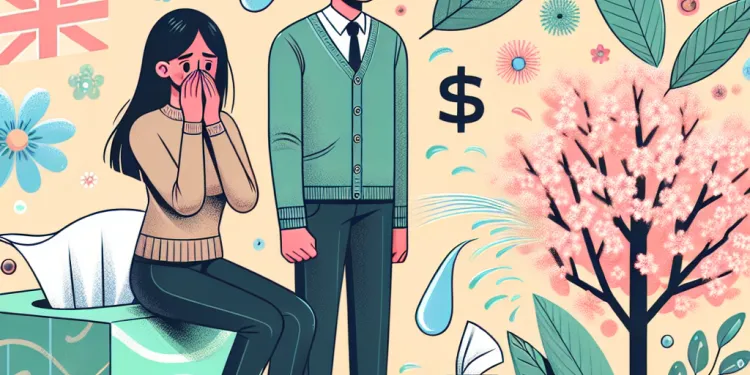
Find A Professional
More Items From Ergsy search
-

What types of nuts can cause allergies?
Relevance: 100%
-

Are nut oils safe for people with nut allergies?
Relevance: 89%
-

Can nut allergies be outgrown?
Relevance: 85%
-

Can tree nuts and peanuts cause cross-reactions?
Relevance: 85%
-

What are Nut Allergies?
Relevance: 79%
-

What is the difference between a nut allergy and intolerance?
Relevance: 74%
-

Can nut allergies develop later in life?
Relevance: 74%
-

What should I do if I think I have a nut allergy?
Relevance: 63%
-

How can nut allergies be managed?
Relevance: 62%
-

How can I prevent cross-contamination with nuts in the kitchen?
Relevance: 57%
-

What foods should I avoid if I have a nut allergy?
Relevance: 56%
-

Is there a cure for nut allergies?
Relevance: 56%
-

What are the symptoms of a nut allergy?
Relevance: 55%
-

How is a nut allergy diagnosed?
Relevance: 54%
-

Is it safe to eat foods labeled as 'may contain nuts'?
Relevance: 48%
-

What should I tell my family and friends about my nut allergy?
Relevance: 38%
-

How are food allergies managed in UK schools?
Relevance: 32%
-

What are Dairy Allergies?
Relevance: 32%
-

What if I have an egg allergy, can I still get the flu vaccine?
Relevance: 32%
-

Is epinephrine the only treatment for severe nut allergy reactions?
Relevance: 30%
-

Is it possible to be allergic to the sun?
Relevance: 26%
-

Dealing with Seasonal Allergies
Relevance: 23%
-

Are there any recent treatments or research developments for nut allergies?
Relevance: 21%
-

How are special dietary requirements catered for in school meals?
Relevance: 20%
-

What is the purpose of providing school meals in the UK?
Relevance: 18%
-

Do pets contribute to hay fever?
Relevance: 15%
-

Are there educational components to the school meal program?
Relevance: 15%
-

How can I reduce my exposure to pollen?
Relevance: 12%
-

What is included in a typical school meal in the UK?
Relevance: 12%
-

What foods can trigger nettle rash?
Relevance: 11%
-

Nutrition for Pregnancy: What to Eat
Relevance: 11%
-

How are school meals provided in the UK?
Relevance: 11%
-

Are school meals inspected for quality and standards?
Relevance: 10%
-

How can parents provide feedback on school meals?
Relevance: 10%
-

What dietary changes can help manage Crohn's disease?
Relevance: 9%
-

What treatments are available for Crohn's disease?
Relevance: 9%
-

The treatment approach for an eating disorder
Relevance: 9%
-

Is there a focus on healthy eating in UK school meals?
Relevance: 9%
-

Can diet affect ADHD symptoms?
Relevance: 9%
-

Who is responsible for providing school meals in the UK?
Relevance: 9%
Understanding Nut Allergies
Nut allergies are a common type of food allergy that can cause various symptoms ranging from mild to life-threatening. While many people associate nut allergies with childhood, it is important to understand that these allergies can develop at any stage of life. Adults who have never had an allergic reaction to nuts before may suddenly find themselves dealing with a new allergy.
Can Adults Develop Nut Allergies?
Yes, adults can develop nut allergies even if they have consumed nuts without any issues in the past. This phenomenon is known as adult-onset food allergy. The exact reasons why someone might develop a nut allergy later in life are not fully understood, but it is believed to involve genetic, environmental, and immunological factors. Changes in the immune system, increased exposure to allergens, or other allergies developing or evolving can contribute to this onset.
Symptoms of Nut Allergies in Adults
The symptoms of nut allergies can vary from person to person. Common reactions include itching or tingling in the mouth, hives, swelling of the face or throat, abdominal pain, nausea, or difficulty breathing. In severe cases, anaphylaxis may occur, which is a potentially life-threatening reaction that requires immediate medical attention. Notably, the severity of these reactions can sometimes catch adults by surprise, as they might have consumed nuts throughout their life without problems.
Diagnosis and Management
If an adult suspects they have developed a nut allergy, it is essential to seek medical advice. An allergist can conduct tests such as skin prick tests or blood tests to confirm the allergy. Once diagnosed, managing a nut allergy typically involves avoiding all nut products and being vigilant about reading food labels. Carrying an epinephrine auto-injector, often known by brand names like EpiPen, is also recommended for individuals at risk of severe reactions.
Preventative Measures and Lifestyle Changes
For those newly diagnosed with a nut allergy, making dietary and lifestyle adjustments is crucial. This includes not only avoiding nuts but also being cautious about cross-contamination when eating out or cooking at home. Many foods might not contain nuts as primary ingredients but can still be exposed to nuts during manufacturing. Having open communication with family, friends, and colleagues about the allergy can help create a supportive environment and reduce the risk of accidental exposure.
Conclusion
While developing a nut allergy later in life can be unexpected, understanding the condition, recognising symptoms, and taking appropriate precautions can help manage the allergy effectively. Awareness and education are key to living safely with a nut allergy, allowing affected individuals to enjoy life while maintaining their health and well-being.
Understanding Nut Allergies
Nut allergies mean that some people can get sick when they eat nuts. This can be serious. Most people think nut allergies start when you are a child, but that's not always true. Adults can also get nut allergies, even if they never had a problem before.
Can Adults Develop Nut Allergies?
Yes, adults can suddenly have nut allergies, even if they ate nuts before without any problem. We don't know exactly why this happens. It might be because of our genes or changes in our body. Sometimes, being around nuts more often or having other allergies can also cause this.
Symptoms of Nut Allergies in Adults
People with nut allergies can have different signs. They might feel itchy in the mouth, or get red bumps on their skin called hives. Their face or throat might swell up, or they might have a stomach ache, feel sick, or have trouble breathing. If it gets very bad, they might have a reaction called anaphylaxis, which is dangerous and needs quick help from a doctor.
Diagnosis and Management
If you think you have a nut allergy, it's important to see a doctor. The doctor might do tests to check if you are allergic. After you know you are allergic, you should stay away from nuts and always check food labels. People with strong allergies should carry a special medicine called an epinephrine auto-injector, like an EpiPen, in case they have a bad reaction.
Preventative Measures and Lifestyle Changes
If you are newly allergic to nuts, you need to change how you eat and live. Avoid nuts and be careful about food touching nuts, especially when eating out. Some foods might not have nuts but could still touch nuts during cooking. Tell your family and friends about your allergy so they can help keep you safe.
Conclusion
Getting a nut allergy as an adult can be surprising. But learning about it and being careful can help keep you safe. It is important to know the signs and stay away from nuts, so you can stay healthy and enjoy life.
Frequently Asked Questions
Can nut allergies develop later in life?
Yes, it is possible for nut allergies to develop at any age, even in adulthood.
What causes nut allergies to develop later in life?
The exact cause is not always clear, but factors may include genetic predisposition, changes in the immune system, or increased exposure to allergens.
What are the symptoms of a nut allergy?
Symptoms can include hives, itching, swelling, difficulty breathing, and even anaphylaxis.
How is a nut allergy diagnosed?
A medical professional can diagnose a nut allergy through skin prick tests, blood tests, and a detailed medical history.
Can a nut allergy appear suddenly?
Yes, a nut allergy can appear suddenly, even if you have previously consumed nuts without issues.
Is it common to develop nut allergies as an adult?
While it's more common for nut allergies to develop in childhood, it is not uncommon for them to appear in adulthood.
Are tree nut allergies and peanut allergies related?
Tree nut and peanut allergies are separate but can co-occur, as both involve different types of proteins that cause allergic reactions.
What should I do if I suspect I have developed a nut allergy?
You should consult an allergist who can perform tests to confirm the allergy and provide guidance on management and treatment.
Can I outgrow a nut allergy that developed later in life?
It is less likely for adults to outgrow nut allergies compared to children, but management can help reduce the risk of reactions.
How can nut allergies be managed?
Management includes avoiding nuts, reading food labels carefully, and carrying an epinephrine auto-injector for emergencies.
Is it possible to have a mild nut allergy?
Yes, some individuals experience milder symptoms, but there is still a risk of severe reactions, so precautions are necessary.
Can cooking destroy nut allergens?
No, cooking does not destroy nut allergens, so they can still cause reactions when ingested.
Are there any treatments available for nut allergies?
Currently, no cure exists, but treatments focus on managing symptoms and emergency interventions with epinephrine.
Can stress affect the development of nut allergies?
Stress isn't a direct cause, but it can influence the immune system, potentially playing a role in the onset of allergies.
Is it safe to eat foods processed in facilities that handle nuts?
Cross-contact risk makes it unsafe for individuals with severe nut allergies to consume products from such facilities.
Can nut allergies be prevented?
There is no guaranteed way to prevent allergies, but early exposure in children might reduce the risk of developing them.
Can environmental factors contribute to developing nut allergies later?
Environmental factors, including diet and lifestyle, may contribute to the onset of food allergies, though this is complex.
What nuts are most commonly associated with allergies?
Common allergenic nuts include peanuts, almonds, walnuts, cashews, pecans, and hazelnuts.
Should I avoid all nuts if I'm allergic to one kind?
It's advisable to consult with an allergist, but some people may only need to avoid specific nuts they're allergic to. However, caution is suggested as cross-reactions can occur.
Are nut allergy reactions the same for everyone?
No, reactions can vary greatly among individuals, including severity and symptoms.
Can you get nut allergies when you are older?
Yes, you can get nut allergies at any age, even when you are grown up.
Why do some people get nut allergies when they are older?
Sometimes, people can become allergic to nuts even when they are older.
Doctors are not sure why this happens, but here are some ideas:
- The way your body reacts to things can change as you grow up.
- Being around nuts more can sometimes start an allergy.
- Other allergies can make new allergies happen.
If you think you have a nut allergy, it is important to see a doctor.
They can help and give advice on how to stay safe.
We don't always know why it happens. It could be because of your genes, your body's defense system changing, or being around things you are allergic to.
What happens if you are allergic to nuts?
Signs can be red and itchy bumps, swelling, finding it hard to breathe, and, in some cases, a serious reaction called anaphylaxis.
How do doctors know if someone is allergic to nuts?
If you think nuts make you sick, visit a doctor. They will help you find out if you are allergic to nuts.
Steps doctors may use:
- Ask questions: The doctor will ask you and your family about when you feel sick after eating nuts.
- Skin test: The doctor puts a tiny bit of nut on your skin. If a bump shows up, you might be allergic.
- Blood test: A test can show if your body reacts strongly to nuts.
If the doctor says you are allergic, they will tell you how to stay safe from nuts.
A doctor can find out if someone is allergic to nuts by doing some tests. These tests include a skin prick test, a blood test, and asking questions about the person’s health and past illnesses.
Can you become allergic to nuts all of a sudden?
Yes, it is possible to suddenly have a nut allergy. This means your body starts reacting badly to nuts, even if you could eat them before without any problems.
If you think you might be allergic to nuts, talk to a doctor. They can help you with tests to find out for sure.
Support tools that can help include:
- Making a list of foods you eat to see if they have nuts.
- Reading food labels carefully to avoid nuts.
- Using allergy alert apps on your phone.
Yes, you can suddenly get an allergy to nuts, even if you ate them before without problems.
Do adults often get nut allergies?
Some grown-ups can start to have nut allergies even if they didn’t have them as kids.
Here are some things that can help:
- Talk to a doctor if you think you have a nut allergy.
- Use apps or charts to help remember which foods have nuts.
- Ask people to tell you if a food has nuts before you eat it.
Most people get nut allergies when they are kids. But some grown-ups can get nut allergies too.
Are tree nut allergies and peanut allergies the same?
Tree nut allergies and peanut allergies are different, but a person can have both at the same time. Tree nuts and peanuts have different proteins that can make people allergic.
What if I think I am allergic to nuts?
If you think nuts make you feel sick:
- Tell an adult you trust, like a parent or teacher.
- Visit a doctor. They can help and do tests.
- Try not to eat any nuts until you know for sure.
- Keep a note of any foods that make you feel unwell.
- Wear a medical bracelet to let others know about your allergy.
Always ask for help if you're unsure!
You should talk to a doctor who knows about allergies. This doctor can do tests to see if you have an allergy. The doctor will also help you learn how to manage it and what treatment you might need.
Can I stop being allergic to nuts if I became allergic as an adult?
Grown-ups don't usually stop being allergic to nuts like kids might. But there are ways to manage allergies to help keep you safe.
How can you look after nut allergies?
If you are allergic to nuts, it's important to stay safe and healthy. Here is how you can manage it:
- Avoid Nuts: Don't eat nuts or foods that might have nuts in them.
- Read Labels: Check food labels for nuts before eating.
- Ask About Food: When eating out, ask if the food has nuts.
- Carry Medicine: Always carry your allergy medicine, like an EpiPen.
- Wear a Bracelet: Wear a medical bracelet that says you have a nut allergy.
- Tell People: Let friends, family, and teachers know about your nut allergy.
These steps can help keep you safe if you have a nut allergy. If you need help because of a bad reaction, get medical help right away.
If you have a nut allergy, here are some things you can do:
- Stay away from nuts.
- Check food labels before eating.
- Always carry a special pen that helps in emergencies. It's called an epinephrine auto-injector.
Can you have a small nut allergy?
Yes, you can have a small allergy to nuts. This means your body might react a little if you eat nuts. You might feel itchy, get a rash, or sneeze. It's important to be careful with nuts.
Talk to a doctor if you think you have a nut allergy. They can help you know what to do. You can use picture charts or apps to remember which foods have nuts.
Yes, some people might feel milder symptoms, but there is still a chance of strong reactions. So, it is important to be careful.
Can cooking get rid of nut allergies?
When you cook nuts, it usually does not make nut allergies go away. People who are allergic to nuts can still have a reaction, even if the nuts are cooked.
If you have a nut allergy, it is important to be careful. Always ask if food has nuts before eating it.
Some helpful tools and tips for people with nut allergies:
- Use a special bracelet or necklace that says you have a nut allergy.
- Ask for help from an adult when choosing food.
- Carry allergy medicine if your doctor gives it to you.
No, cooking does not make nut allergens go away, so they can still make you sick if you eat them.
Can you help if someone is allergic to nuts?
Yes, doctors can help if someone has a nut allergy. They might use medicine or teach them how to stay away from nuts. If you’re worried, talking to a doctor is a good idea. Carrying an EpiPen can also help in emergencies.
Right now, there is no way to make it go away completely. But doctors can help with treatments to make you feel better. In emergencies, they use a special medicine called epinephrine.
Can stress cause nut allergies to grow?
Stress does not directly cause allergies. But, when you are stressed, it can affect your body's defenses. This might help allergies start.
Can I eat food made in places that use nuts?
Some foods are made in places where they use nuts. This means that even if the food does not have nuts in it, it might still have tiny bits of nuts. Check the food label to see if nuts might be in it.
If you have a nut allergy, talk to a doctor. A doctor can help you know what is safe for you.
You can also use tools like pictures or apps that help you understand the labels on food.
If someone is very allergic to nuts, it is not safe for them to eat food from places that use nuts. This is because even a tiny bit of nuts can get into the food and make them sick.
Can we stop nut allergies?
We can't stop allergies for sure, but letting kids get used to things early might help them not get allergies later.
Can things around us make people allergic to nuts as they get older?
Some people might not be allergic to nuts when they are young but can become allergic as they get older.
Here are some things that might help you understand:
- Watch out for changes in your body when you eat nuts.
- Keep a journal to write down any signs or feelings after eating nuts.
- Talk to a doctor if you think you might be allergic to nuts.
- Use clear, simple apps or videos to learn more about allergies.
Things like what we eat and how we live can sometimes cause food allergies. But this is very complicated.
Which nuts cause the most allergies?
Some nuts can make people sick. These nuts are peanuts, almonds, walnuts, cashews, pecans, and hazelnuts.
Should I stay away from all nuts if I'm allergic to one type?
If you know you are allergic to one kind of nut, it can be safer to avoid all nuts. This is because some nuts are often prepared near each other, and this can mix them up.
Here are some things you can do:
- Talk to your doctor: They can tell you what is best for you.
- Read labels: Look at food labels to check if nuts are inside.
- Ask questions: When you eat out, ask if any dishes have nuts.
It is always a good idea to carry medicine your doctor gives you for allergies.
It is a good idea to talk to a doctor who knows a lot about allergies. Some people might only have to stay away from certain nuts that make them sick. But it's important to be careful because sometimes other nuts can also cause a reaction.
Do nut allergies affect everyone in the same way?
No, people can have very different reactions. Reactions can be strong or mild, and they can show up in different ways.
Useful Links
- Ergsy carfully checks the information in the videos we provide here.
- Videos shown by Youtube after a video has completed, have NOT been reviewed by ERGSY.
- To view, click the arrow in centre of video.
- Most of the videos you find here will have subtitles and/or closed captions available.
- You may need to turn these on, and choose your preferred language.
- Go to the video you'd like to watch.
- If closed captions (CC) are available, settings will be visible on the bottom right of the video player.
- To turn on Captions, click settings .
- To turn off Captions, click settings again.
More Items From Ergsy search
-

What types of nuts can cause allergies?
Relevance: 100%
-

Are nut oils safe for people with nut allergies?
Relevance: 89%
-

Can nut allergies be outgrown?
Relevance: 85%
-

Can tree nuts and peanuts cause cross-reactions?
Relevance: 85%
-

What are Nut Allergies?
Relevance: 79%
-

What is the difference between a nut allergy and intolerance?
Relevance: 74%
-

Can nut allergies develop later in life?
Relevance: 74%
-

What should I do if I think I have a nut allergy?
Relevance: 63%
-

How can nut allergies be managed?
Relevance: 62%
-

How can I prevent cross-contamination with nuts in the kitchen?
Relevance: 57%
-

What foods should I avoid if I have a nut allergy?
Relevance: 56%
-

Is there a cure for nut allergies?
Relevance: 56%
-

What are the symptoms of a nut allergy?
Relevance: 55%
-

How is a nut allergy diagnosed?
Relevance: 54%
-

Is it safe to eat foods labeled as 'may contain nuts'?
Relevance: 48%
-

What should I tell my family and friends about my nut allergy?
Relevance: 38%
-

How are food allergies managed in UK schools?
Relevance: 32%
-

What are Dairy Allergies?
Relevance: 32%
-

What if I have an egg allergy, can I still get the flu vaccine?
Relevance: 32%
-

Is epinephrine the only treatment for severe nut allergy reactions?
Relevance: 30%
-

Is it possible to be allergic to the sun?
Relevance: 26%
-

Dealing with Seasonal Allergies
Relevance: 23%
-

Are there any recent treatments or research developments for nut allergies?
Relevance: 21%
-

How are special dietary requirements catered for in school meals?
Relevance: 20%
-

What is the purpose of providing school meals in the UK?
Relevance: 18%
-

Do pets contribute to hay fever?
Relevance: 15%
-

Are there educational components to the school meal program?
Relevance: 15%
-

How can I reduce my exposure to pollen?
Relevance: 12%
-

What is included in a typical school meal in the UK?
Relevance: 12%
-

What foods can trigger nettle rash?
Relevance: 11%
-

Nutrition for Pregnancy: What to Eat
Relevance: 11%
-

How are school meals provided in the UK?
Relevance: 11%
-

Are school meals inspected for quality and standards?
Relevance: 10%
-

How can parents provide feedback on school meals?
Relevance: 10%
-

What dietary changes can help manage Crohn's disease?
Relevance: 9%
-

What treatments are available for Crohn's disease?
Relevance: 9%
-

The treatment approach for an eating disorder
Relevance: 9%
-

Is there a focus on healthy eating in UK school meals?
Relevance: 9%
-

Can diet affect ADHD symptoms?
Relevance: 9%
-

Who is responsible for providing school meals in the UK?
Relevance: 9%